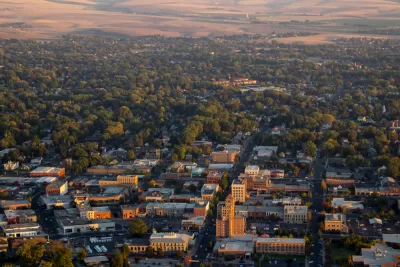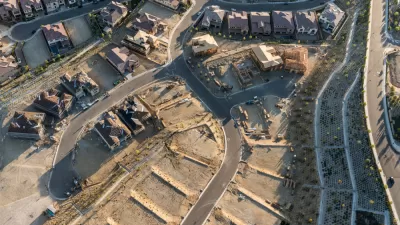The Washington city reformed its zoning code to support more multifamily development and a diversity of housing types to meet the needs of its growing population.

With their town surrounded by valuable agricultural land, officials in Walla Walla, Washington are particularly attuned to the need to rein in sprawl and encourage smart growth as the population grows. As Patrick Sisson explains in Planning Magazine, when it came time to update the city’s comprehensive plan, the city’s planners worked to reform and streamline complicated, outdated zoning codes and support more density and multifamily development.
“The answer was Neighborhood Residential (RN), a near-universal residential zoning designation that allows builders to go as dense as 75 units per acre, given that they still meet existing standards like landscaping, height, setbacks, parking, and lot coverage.” The city also updated regulations for accessory dwelling units (ADUs), eliminating owner-occupied restrictions and raising the size limit.
Sisson’s article details the changes, the process of getting them approved, and the positive reactions from many residents and builders. While Sisson admits that “So far, the numbers aren't showing a dramatic change,” due to the pandemic, there is some progress, and “developers have begun investing in new types of projects, including apartment complexes and conversions of motels into affordable housing.” According to Sisson, the city is also considering expanding a tax incentive for multifamily housing and creating a community land trust.
FULL STORY: Zoning Reform Creates New Model for Smart Growth in Walla Walla, Washington

Alabama: Trump Terminates Settlements for Black Communities Harmed By Raw Sewage
Trump deemed the landmark civil rights agreement “illegal DEI and environmental justice policy.”

Study: Maui’s Plan to Convert Vacation Rentals to Long-Term Housing Could Cause Nearly $1 Billion Economic Loss
The plan would reduce visitor accommodation by 25% resulting in 1,900 jobs lost.

Planetizen Federal Action Tracker
A weekly monitor of how Trump’s orders and actions are impacting planners and planning in America.

Waymo Gets Permission to Map SF’s Market Street
If allowed to operate on the traffic-restricted street, Waymo’s autonomous taxis would have a leg up over ride-hailing competitors — and counter the city’s efforts to grow bike and pedestrian on the thoroughfare.

Parklet Symposium Highlights the Success of Shared Spaces
Parklets got a boost during the Covid-19 pandemic, when the concept was translated to outdoor dining programs that offered restaurants a lifeline during the shutdown.

Federal Homelessness Agency Places Entire Staff on Leave
The U.S. Interagency Council on Homelessness is the only federal agency dedicated to preventing and ending homelessness.
Urban Design for Planners 1: Software Tools
This six-course series explores essential urban design concepts using open source software and equips planners with the tools they need to participate fully in the urban design process.
Planning for Universal Design
Learn the tools for implementing Universal Design in planning regulations.
Caltrans
Smith Gee Studio
Institute for Housing and Urban Development Studies (IHS)
City of Grandview
Harvard GSD Executive Education
Toledo-Lucas County Plan Commissions
Salt Lake City
NYU Wagner Graduate School of Public Service




























